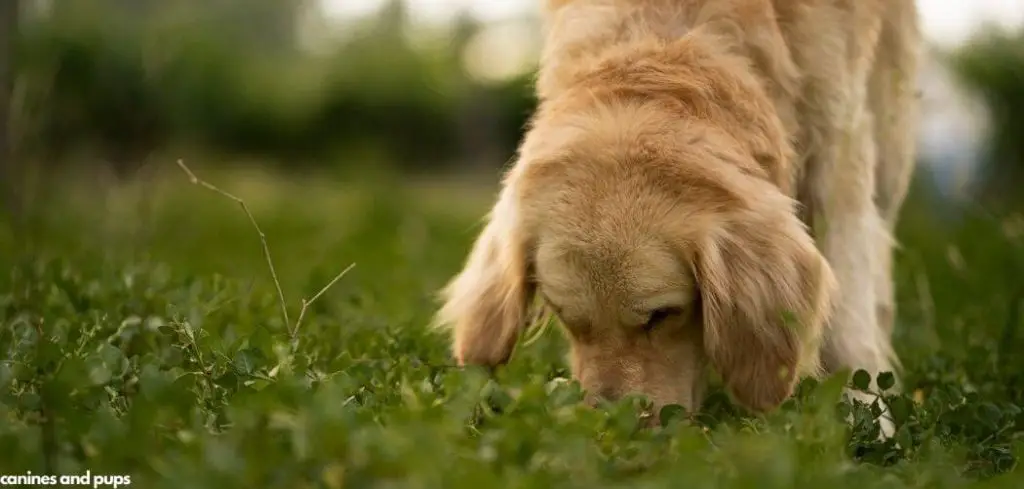It can be alarming to wake up in the middle of the night and find a dog frantically eating grass. Dogs usually sleep during nighttime hours, so this unusual activity should not be ignored.
We outline the common reasons why a dog may frantically eat grass in the middle of the night, what you can do, and when to seek veterinary help.
Dog Eating Grass Frantically Middle of Night — Why It Happens
Dogs may eat grass frantically in the middle of the night due to nausea, digestive upset, anxiety, or even underlying medical issues. Sometimes, the behavior is linked to a sudden stomach irritation, while other times it’s related to conditions like acid reflux, dietary imbalance, or even stress.
Nighttime episodes can also occur if a dog feels unwell and instinctively seeks grass to induce vomiting or soothe discomfort.
Because this happens outside of normal feeding and activity times, it can be a strong indicator that something more serious is at play.

Dog Eating Grass Frantically Middle of Night: Common Causes
Gastrointestinal Upset
One of the most common reasons a dog suddenly eats grass at night is stomach upset.
Acid buildup, indigestion, or mild nausea can drive a dog to seek relief. Dogs may eat grass quickly and in large amounts in an attempt to make themselves vomit.
Owners often notice pacing, restlessness, or drooling before the grass-eating begins. If this becomes frequent, it may point to a chronic digestive condition that requires veterinary evaluation.
Read more: Dog suddenly excessively eating grass (What it means)
Acid Reflux
Dogs can experience acid reflux just like humans. This discomfort often worsens at night when the stomach is empty, leading a dog to frantically eat grass to ease irritation.
Signs can include licking lips, swallowing excessively, and burping in addition to nighttime grass-eating. Left untreated, acid reflux can cause long-term esophageal irritation and pain.
Anxiety or Stress
Some dogs experience nighttime anxiety, particularly those prone to separation anxiety or restlessness.
Stress can trigger abnormal behaviors, including frantic grass consumption. Dogs may wake suddenly, pace, whine, and then head outside to eat grass as a coping mechanism.
If anxiety is a recurring issue, it may require both behavioral support and veterinary intervention.
Dietary Deficiency
If a dog’s diet is lacking in certain nutrients or fiber, they may seek out grass to fill the gap. While occasional grass eating is common, frantic episodes in the middle of the night suggest the body is urgently craving something missing.
This may be linked to low fiber, missing minerals, or even poor-quality food. Correcting the diet often resolves this cause.
Parasites or Infection
Worm infestations or intestinal infections can irritate the stomach and intestines, making a dog desperate for relief.
Dogs with parasites may eat grass excessively, vomit, lose weight, or have diarrhea. If frantic grass eating occurs alongside these signs, it’s important to consider a veterinary exam and fecal testing to rule out parasites.
Serious Conditions (Pancreatitis or Toxicity)
In rare cases, frantic nighttime grass eating can point to a more serious problem such as pancreatitis or ingestion of something toxic.
Both conditions can cause sudden nausea and distress. Signs may include vomiting, abdominal pain, lethargy, or collapse. These situations are medical emergencies and require immediate veterinary attention.
What to Do
If a dog suddenly wakes and eats grass frantically at night, owners can take a few practical steps at home. First, observe the dog closely for additional symptoms such as drooling, vomiting, restlessness, or lethargy.
Keeping track of how often the behavior happens can help identify a pattern.
Providing smaller, more frequent meals throughout the day and evening may reduce nighttime stomach irritation.
Offering a late-night snack or dog-safe treat can sometimes help prevent acid reflux. Ensuring the dog’s diet is balanced and high in quality is also important.
For dogs with anxiety-driven behavior, providing a calming nighttime routine, comfort, or safe space can make a difference.
However, if frantic grass eating happens often or worsens, it should not be managed at home long-term without veterinary guidance.
When to Call or Visit Your Vet
It is important to call a vet if frantic nighttime grass eating happens repeatedly or is paired with concerning symptoms.
Vomiting, diarrhea, abdominal bloating, drooling, or signs of pain should be treated as urgent. Any sudden collapse, weakness, or refusal to move requires emergency care.
If a dog has never shown this behavior before and suddenly begins eating grass frantically at night, it’s worth scheduling a veterinary check-up.
Blood tests, dietary reviews, and parasite screenings can help identify underlying causes. Acting early can prevent more serious complications.
Read more: Dog Eating Grass Excessively (Here’s Why)
Key Takeaway
A dog eating grass frantically in the middle of the night is often a sign of discomfort, nausea, or stress.
While occasional grass eating may not be alarming, repeated frantic episodes—especially at unusual hours—suggest an underlying issue that needs attention.
By monitoring the dog’s behavior, adjusting feeding routines, and seeking veterinary guidance when necessary, owners can ensure their pet stays healthy and comfortable.
If the behavior persists or is accompanied by other worrying symptoms, prompt veterinary care is the safest course of action.
